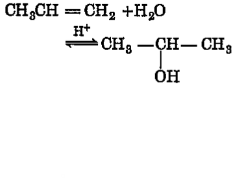In the presence of an acid catalyst, two alcohol molecules will undergo dehydration to give
A
ether
B
ester
C
anhydride
D
acid
Video Solution
Text Solution
The correct Answer is:A
2ROHconc.H2SO4−−−−−−−→413KR−O−R+H2O
|
Updated on:21/07/2023
Topper's Solved these Questions
- BOOK - MARVEL PUBLICATIONCHAPTER - ALCOHOL,PHENOLS AND ETHERS EXERCISE - Test your Grasp : Alcohols and Phenols40videos
ALCOHOL,PHENOLS AND ETHERS
- BOOK - MARVEL PUBLICATIONCHAPTER - ALCOHOL,PHENOLS AND ETHERS EXERCISE - Test your Grasp : Ethers30videos
ALCOHOL,PHENOLS AND ETHERS
- BOOK - MARVEL PUBLICATIONCHAPTER - ALDEHYDES,KETONES AND CARBOXYLIC ACIDSEXERCISE - CARBOXYLIC ACIDS198videos
ALDEHYDES,KETONES AND CARBOXYLIC ACIDS
Similar Questions
Knowledge Check
- Question 1 - Select One
In the presence of alumina as catalyst , two alcohol molecules will undergo dehydration and form
AesterBetherCanhydrideDaldehyde - Question 2 - Select One
In the presence of alumina as catalyst , two alcohol molecules will undergo dehydration and form
AEsterBEtherCAnhydrideDAlcohol - Question 3 - Select One
Alkenes react with water in the presence of acid as catalyst to from alcohols.

The reaction takes place in accordance withAHofmann elimination ruleBSaytzeff's ruleCMarkownikoff's ruleDAnti-Markovnikov's addition
1∘ alcohols preferably undergo dehydration via
View SolutionIntermolecular dehydration of alcohol gives
View SolutionIntermolecular dehydration of alcohols gives
View SolutionIn the presence of acid catalyst, ethanoic acid reacts with ethanol and ………. ester is produced.
View SolutionPrimary alcohols on dehydration give
View Solution

